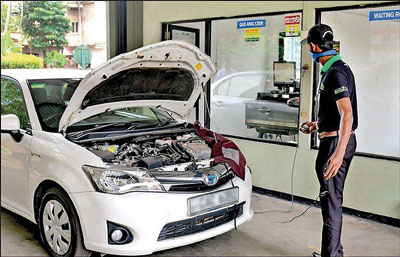News
Motor Traffic Dept. gears for fresh ‘test’ drive to mark zero emission day
View(s):- If you spot a smoke-belching vehicle, take a picture and send to Dept. via WhatsApp or Viber
By Jayani Madawala
The Motor Traffic Department has introduced an improved Vehicle Emission Test (VET) to mark Zero Emission Day on September 21.
Zero Emissions Day is an international day of action to demand a future without air pollution which directly contributes to global warming.
The emission test measures the level of fumes or pollutants released from a vehicle. This is to lessen the release of harmful air pollutants into the environment. The test detects the level of hydrocarbons, carbon dioxide, nitrogen oxide, carbon monoxide, and other air pollutants.

The vehicle emission testing programme is purely for the benefit of Sri Lankans, say officials
The Zero Emission movement began in 2008 when its founder, Ken Wallace, published a website in Nova Scotia, Canada, calling for a declaration recognizing September 21 as zero-emission day.
The primary source of ambient or outdoor air pollution in Sri Lanka is considered to be vehicular exhausts which in the City of Colombo are estimated to be around 55 percent of the total emissions.
Following the Supreme Court ruling in a fundamental rights case filed by a concerned citizen in 1998, the Environment Ministry published regulations to control vehicle emissions.
The Transport Ministry has also been introducing regulations since 2008 under the Motor Traffic Act to facilitate the enforcement of emission standards and the implementation of the vehicular emission testing (VET) programme.
Accordingly, the Motor Traffic Department authorised two contractors to operate accredited VET centres to test motor vehicles and issue certificates.
Aiming to control the level of harmful exhaust from vehicles, the initiation of the VET programme in 2008 is considered a significant milestone in the management of air quality.
According to Motor Traffic Department data up to 2020, the total vehicle population in Sri Lanka has already passed the 8 million mark.
Amidst this ever-increasing vehicle fleet, the importance of controlling the deterioration of air quality is much more vital than ever before. Under this situation, the VET programme is expected to play an unparalleled valuable role to keep the ambient air quality at a healthy level, satisfactorily limiting the influx of harmful pollutants into the atmosphere, Motor Traffic Department officials say.
It is widely accepted that there is a significant correlation between air pollution and health impacts. It causes more than 7 million premature deaths all around the world annually, according to a World Health Organisation report. As a major source of air pollution, controlling vehicle exhaust emission greatly enhances public health conditions, it said.
Further, as high emission mostly occurs due to unburnt and partially burnt fuel conditions, control of emission results in a reduction in unnecessary fuel consumption by the engine. Results of emission tests also help users to know engine performance, experts say.
In diesel vehicles, faulty fuel sprays from injectors and fuel pumps with erroneous pressures together with clogged air filters often lead to excessive black smoke. Petrol vehicles, including motorbikes and three-wheelers with carburetor engines, emit higher emissions due to improper adjustment of the air-fuel ratio. Under prevailing emission standards, due to clogged air cleaners, even EFI (electronic fuel injection) engines may fail in tests due to the high emission of pollutants, the experts said.
The VET programme does not generate any direct tax for the government. A 10 percent of the emission test fee is transferred to the Vehicle Emission Tests (VET) Trust fund which can only be used to improve Sri Lanka’s air quality.
Since its inception, the VET fund has contributed in many ways to enhancing ambient air quality. Considering the importance of measuring ambient air quality, the VET fund procured automated ambient air quality monitoring stations (AAQMS) for the National Building Research Organization (NBRO) and the Central Environment Authority (CEA).
During the emission testing, 47 data fields are taken from the motorist and sent to the servers maintained by the Information and Communication Technology Agency (ICTA). These data are important to make informed decisions not only on environmental aspects but also on traffic management, fuel consumption and other vehicle-related subjects.
The vehicle emission testing programme is purely for the benefit of Sri Lankans, the official said.
The Motor Traffic Department requests the public to send spotter photographs of smoke-belching vehicles, mentioning the time and location to 0703500525 via WhatsApp or Viber, for it to take action against vehicle owners.
The best way to say that you found the home of your dreams is by finding it on Hitad.lk. We have listings for apartments for sale or rent in Sri Lanka, no matter what locale you're looking for! Whether you live in Colombo, Galle, Kandy, Matara, Jaffna and more - we've got them all!

